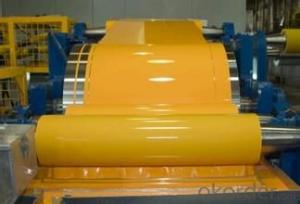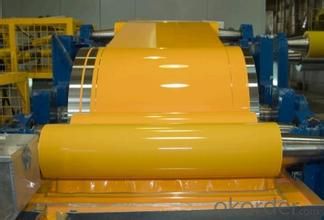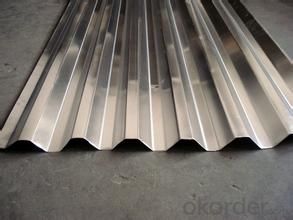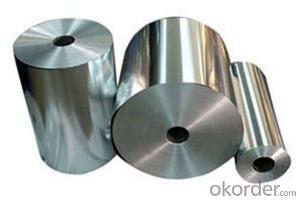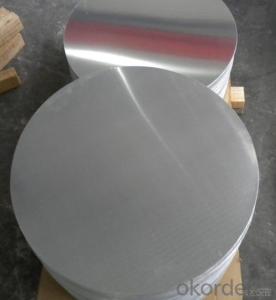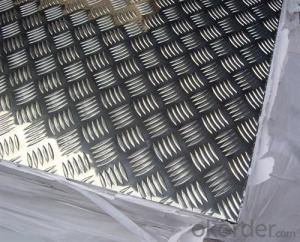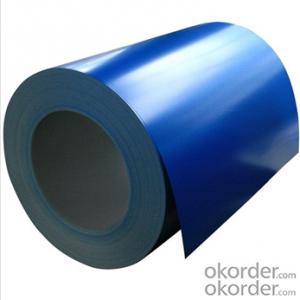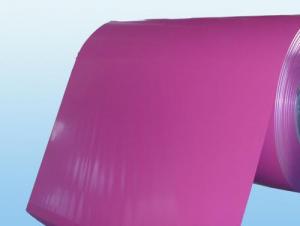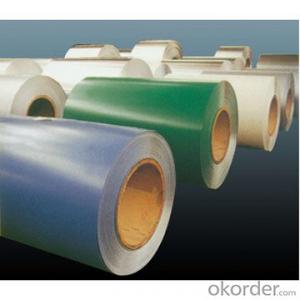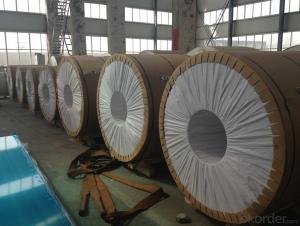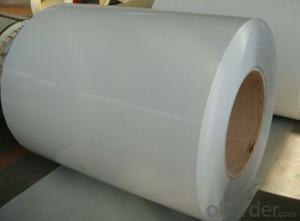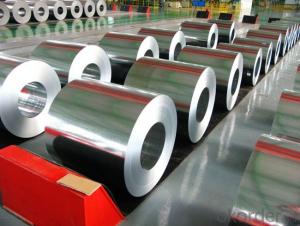Aluminum Coil 1100 Prepainted for Garage Door
- Loading Port:
- China Main Port
- Payment Terms:
- TT OR LC
- Min Order Qty:
- -
- Supply Capability:
- -
OKorder Service Pledge
OKorder Financial Service
You Might Also Like
Aluminium is a relatively soft, durable, lightweight, ductileand malleablemetalwith appearance ranging from silvery to dull gray, depending on the surfaceroughness. It is nonmagnetic and does not easily ignite. A fresh film ofaluminium serves as a good reflector (approximately 92%) of visible lightand an excellent reflector (as much as 98%) of medium and far infraredradiation. The yield strength of pure aluminium is 7–11 MPa,while aluminium alloys have yield strengths ranging from200 MPa to 600 MPa. Aluminium has about one-third the densityand stiffness of steel. It is easily machined,cast, drawn and extruded.
Aluminium alloys (or aluminum alloys; see spellingdifferences) are alloysin which aluminium(Al) is the predominant metal. The typical alloying elements are copper, magnesium,manganese,silicon,tin and zinc. There are twoprincipal classifications, namely casting alloys and wrought alloys, both of which are furthersubdivided into the categories heat-treatableand non-heat-treatable. About 85% of aluminium is used for wrought products,for example rolled plate, foils and extrusions.Cast aluminium alloys yield cost-effective products due to the low meltingpoint, although they generally have lower tensile strengthsthan wrought alloys. The most important cast aluminium alloy system is Al–Si,where the high levels of silicon (4.0–13%) contribute to give good castingcharacteristics. Aluminium alloys are widely used in engineering structures andcomponents where light weight or corrosion resistance is required
Specification:
Alloy: AA1050, 1060, 1100,AA3003, 3005, 3015, 5052, 5754, 5083,8011, etc
Temper:H14/16/18/22/24/32, HO etc.
Thickness:0.2mm—100mm
Width: 100mm—2300mm (Can be slitted)
InnerDiameter: 508MM
Coil Weight:500kg-3000kg(Max.)
Application:Foil stock, Circles, Roofing, Can stock, Marine plate,Anti-slipery purpose in vehicles, packing and appliance.
Features:
1. Excellent quality of products
2. Quick delivery
3. Best service to clients
4. BV,SGS avalible
5. No buckle o waveness
6. Tension leveling
7. Certificate of Origin
8. Form A,E
Packaging Detail:
Carton ,Woodenpallet with plastic protection packing ,standard seaworthy packing or as yourrequest.
ProductionCapacity:
AnnualProduction capacity of 600,000 tons.
Products areexported to United States, Canada, U.A.E, Brazil, Mexico,Thailand, Vietnam,Nigeria etc, over 100 countries andregions all over the world.
Production Line:
CNBM aluminumproduction base is comprised of 18 aluminumannealers, 10 coil and foilmills, 4 continuous production lines, 2hot rolling production line and 3prepainted lines.
FAQ:
1. What is the form of payment?
Normally 30% TT, L/C
2. Type of quotation?
FOB, CFR, CIF
3. Port of loading?
Shanghai port
4. Delivery time?
30 day after client’s deposit
- Q: How long do aluminum coils typically last?
- Aluminum coils typically have a lifespan of around 15 to 20 years. However, the longevity of the coils greatly depends on several factors such as the quality of the aluminum used, the installation process, and the maintenance and care provided. Regular maintenance, such as cleaning the coils and ensuring proper airflow, can significantly extend their lifespan. Additionally, environmental factors like exposure to harsh weather conditions and corrosive substances can also affect their durability. Therefore, while aluminum coils have a decent lifespan, it is essential to provide proper care and maintenance to ensure their longevity.
- Q: Can aluminum coils be welded or joined together?
- Yes, aluminum coils can be welded or joined together using various methods such as TIG (Tungsten Inert Gas) welding, MIG (Metal Inert Gas) welding, or using specialized aluminum welding techniques.
- Q: Can aluminum coils be used in the production of heat exchangers?
- Yes, aluminum coils can be used in the production of heat exchangers. Aluminum is a commonly used material in heat exchangers due to its excellent thermal conductivity, lightweight nature, and corrosion resistance. The use of aluminum coils allows for efficient heat transfer and helps in optimizing the overall performance of the heat exchanger.
- Q: Is it possible to utilize aluminum coils for crafting artistic installations or distinctive creations?
- <p>Yes, aluminum coils can be used to create art installations and other unique creations. Their malleability, durability, and lightweight nature make them ideal for sculptural works. Artists can bend, shape, and weld aluminum coils into various forms, offering a wide range of design possibilities. The material's reflective surface can also add visual interest, especially when used in installations that interact with light and shadow. Additionally, aluminum's resistance to corrosion makes it suitable for outdoor art pieces, ensuring longevity and low maintenance.</p>
- Q: What are the different types of surface coatings for aluminum coils?
- There are several different types of surface coatings that can be applied to aluminum coils. These coatings serve to protect the aluminum from corrosion, enhance its appearance, and improve its durability. Some of the common types of surface coatings for aluminum coils include: 1. Polyester: Polyester coatings are popular for their excellent color retention and resistance to fading. They provide a smooth, glossy finish and are commonly used for architectural applications. 2. Polyvinylidene Fluoride (PVDF): PVDF coatings offer exceptional weather resistance and durability. They are highly resistant to UV radiation, chemicals, and abrasion, making them suitable for outdoor applications and environments with harsh conditions. 3. Epoxy: Epoxy coatings provide good chemical resistance and adhesion. They are often used in industrial settings where corrosion protection is crucial, such as in chemical processing plants and marine applications. 4. Polyurethane: Polyurethane coatings are known for their durability and resistance to abrasion. They are commonly used in high-traffic areas or applications where the aluminum surface may be subjected to frequent contact or wear. 5. Acrylic: Acrylic coatings offer good weather resistance and color retention. They provide a smooth, glossy finish and are commonly used in architectural and decorative applications. 6. Plastisol: Plastisol coatings are a type of vinyl coating that provides excellent corrosion resistance and flexibility. They are often used in applications where the aluminum surface needs to withstand bending or forming without cracking or peeling. It is important to note that each type of coating has its own unique properties and advantages, and the choice of coating will depend on the specific requirements of the application, such as the level of corrosion resistance, aesthetic preferences, and environmental conditions.
- Q: How are aluminum coils used in the production of architectural structures?
- Due to their advantageous properties, aluminum coils play a crucial role in the production of architectural structures. Their lightweight, strength, and corrosion resistance make them highly valued in the construction industry. Roofing systems in architectural structures commonly utilize aluminum coils. The lightweight nature of aluminum makes installation easy and reduces the overall load on the building. Additionally, aluminum's corrosion resistance ensures that the roofing system remains durable and long-lasting, regardless of weather conditions. Aluminum coils are also employed in the creation of exterior cladding systems. Their ability to be formed into various shapes and sizes allows for the development of unique and visually appealing architectural designs. Furthermore, aluminum's resistance to corrosion and ability to withstand harsh environmental factors make it an ideal choice for cladding systems, guaranteeing the structure's longevity and aesthetics. Windows and doors in architectural structures often incorporate aluminum coils in their production. The lightweight properties of aluminum make handling and installation effortless, while its high strength provides structural integrity to these components. Furthermore, aluminum's corrosion resistance results in long-lasting windows and doors that require minimal maintenance. In summary, aluminum coils are an essential component in the production of architectural structures. Their lightweight, strength, and corrosion resistance make them the preferred choice for roofing, cladding, windows, and doors. By utilizing aluminum coils, architects and builders can create sustainable structures that are durable, aesthetically pleasing, and withstand the test of time.
- Q: Why does aluminum foil barely get hot in the oven, but catch fire in the microwave?
- Your fsats are wrong. Al foil gets hot in the oven and doesn't cstch fire in the micowave
- Q: What is the typical lead time for ordering aluminum coils?
- The lead time for ordering aluminum coils can vary depending on factors such as the supplier, quantity ordered, and current market conditions. Typically, lead times for aluminum coils can range from a few weeks to several months. If the supplier has the coils readily available in their stock, the lead time can be relatively short, usually around 2-4 weeks. This is the case when the supplier consistently maintains inventory and has the desired specifications and quantities ready for immediate shipment. However, if the coils need to be customized or if the supplier lacks sufficient stock, the lead time can be longer. Customizing aluminum coils may require additional processing time, such as rolling, annealing, or coating, which can extend the lead time by a few weeks or even months. Moreover, lead times can be influenced by market conditions and demand fluctuations. When there is high demand or disruptions in the supply chain, lead times may increase due to limited availability of raw materials or production capacity. For a more accurate estimate of the lead time for ordering aluminum coils, it is advisable to directly contact the specific supplier or manufacturer. They can provide detailed information based on their current inventory, production capabilities, and any other factors that may impact lead times.
- Q: Classification of aluminium rolls for aluminium rolls
- On behalf of 6061, mainly contains two elements of magnesium and silicon, so it focuses on the advantages of the 4000 series and the 5000 series, and the 6061 is a cold treatment aluminum forging product, which is suitable for applications with high corrosion resistance and oxidation resistance.
- Q: What are the typical delivery methods for aluminum coils?
- Aluminum coils are transported using various delivery methods, which depend on the size and quantity of the coils. However, there are several commonly used methods in the industry. Trucks are one of the most frequently employed methods. Aluminum coils are typically transported on flatbed trucks, providing a secure and stable platform during transit. This method is suitable for both short and long-distance deliveries, and it allows for easy loading and unloading at the destination. Rail transportation is another popular method. It is often used when larger quantities of aluminum coils need to be delivered or when the distance is significant. Rail cars equipped with flatbeds or specialized coil cars are used to transport the coils safely and efficiently. This method is particularly advantageous for long-distance deliveries, as it is generally more cost-effective and eco-friendly compared to other modes of transportation. Sea transportation is sometimes used for delivering aluminum coils. This method is commonly employed for international shipments or when the coils need to be transported over long distances. Coils are typically packed into containers to ensure their safety and protection during the journey. Although shipping by sea allows for efficient transportation of large quantities of coils, it may take longer due to customs procedures and port handling. For smaller quantities of aluminum coils, air freight can be utilized. This method is often chosen when time is of the essence or for urgent shipments. Airplanes with cargo holds are used to transport the coils, ensuring their safe and expedited delivery. However, it is generally more expensive than other delivery methods, so it is typically reserved for time-sensitive or high-value shipments. In conclusion, the delivery methods for aluminum coils include trucks, rail, sea, and air. The appropriate method is selected based on factors such as size, quantity, distance, urgency, and cost considerations.
Send your message to us
Aluminum Coil 1100 Prepainted for Garage Door
- Loading Port:
- China Main Port
- Payment Terms:
- TT OR LC
- Min Order Qty:
- -
- Supply Capability:
- -
OKorder Service Pledge
OKorder Financial Service
Similar products
Hot products
Hot Searches
Related keywords
